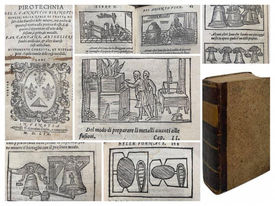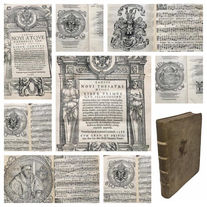top of page

(Cesare BECCARIA) / VOLTAIRE - Dei Delitti e delle Pene / Commentaire sur le livre Des Delits - 1766
PRICE
$5400
(Cesare BECCARIA) / VOLTAIRE, Francois-Marie AROUET – Dei Delitti e delle Pene edizione quinta di nuovo corretta ed accresciuta — Commentaire sur le livre Des Delits et des Peines par M. De Voltaire / Relation de la mort du Chevalier De la Barre par Mr. Cass Avocat au Conseil du Roi, à Mr. le Marquis de Beccaria – 1766. Harlem, no place (but Livorno?) / No place. Half leather with gilt titles and friezes on the spine, five raised bands, cardboards, sprayed fore-edges sedicesimo, 18.8 cm / 17.4 cm; 1 vol. / 2 vols. bound in 1; pp. XII 164 – pp. 104 III (index); 24; both bindings with peeling at the corners and lacks on the spines, a slight trace of damp on both boards of the Beccaria volume, some slight holes and woodworm walkways that do not compromise the usability of the text, some papers a little browned, but good copies with wide margins. Engraved vignettes, endings and drop caps / French text; engraved vignettes; coeval indication bearing the name of the Author on the back of the first blank. Fifth clandestine edition (the first dates back to 1764) with fictitious editorial indication of Harlem in the Netherlands, but probably printed in Livorno. This is the first definitive version of the work, with all the 47 paragraphs that made it famous. The text begins with a Notice about the French translation of the work thanks to Andrè Morellet, followed by the famous A who reads in which a brief overview of the law is traced, the first criticisms are faced (pending new and more vigorous ) and, by means of special signs, it is permitted to identify the additions of this edition. Dei Delitti e Delle Pene is undoubtedly a classic of Enlightenment thought and jurisprudence as a whole. It stands as a regulatory text and as anathema against torture and the death penalty, except in cases deemed exceptional. The book, in 1766, was included in the Index of Prohibited Books at the behest of the Holy Office. The cause of this was the distinction that Beccaria identifies between the categories of sin and crime. In any case, the work was immediately very successful, especially across the border, where translations gradually increased, both in circulation and in language. / First clandestine edition of Voltaire’s Commentary on Cesare Beccaria’s famous Dei Delitti e Delle Pene. Just like the Italian Illuminist, Voltaire theorizes the abolition of torture and the gradual extinction of the death penalty, judged to be detrimental to the natural right to life. In fact, he transcends the purely legal element to cross over into the fields of natural law and ethics, even surpassing Beccaria. In his commentary, he also introduces themes such as relations with heresies, profanation, preaching, witchcraft, etc., which had not been dealt with by the author of Dei Delitti e Delle Pene. Our copy is part of the first absolute edition of the Commentaire, an edition that we believe to have been distributed in a very small number of copies, only to be replaced (if not withdrawn?) by the next edition of the same year, published in a totally anonymous form, due to inquisitorial attacks, and stylistically correct. The work added as a sort of supplement to the commentary is a letter written to Voltaire himself, relating to a news story that also occurred in 1766, in which the drafter again lashes out against torture and capital punishment.
bottom of page





